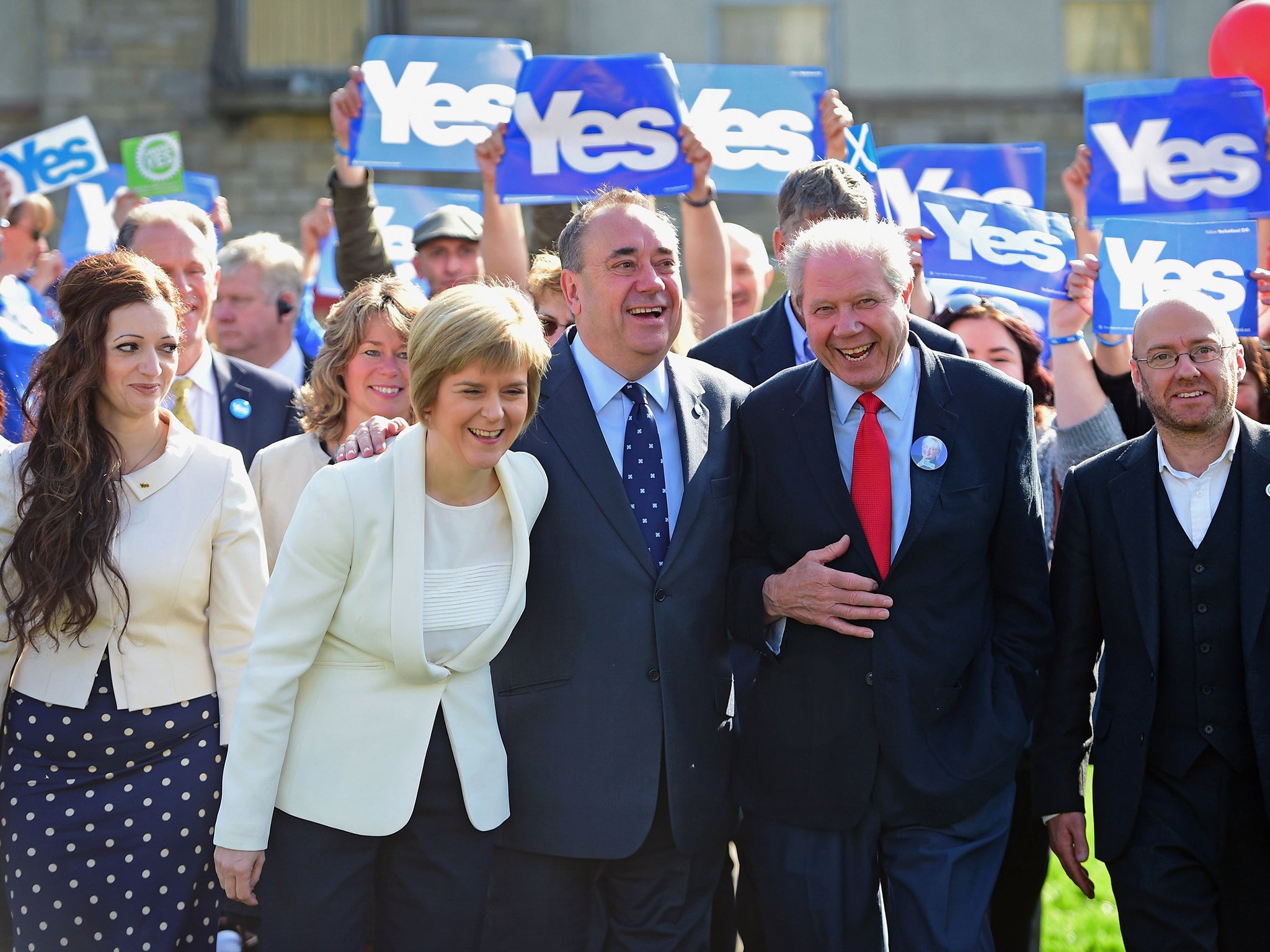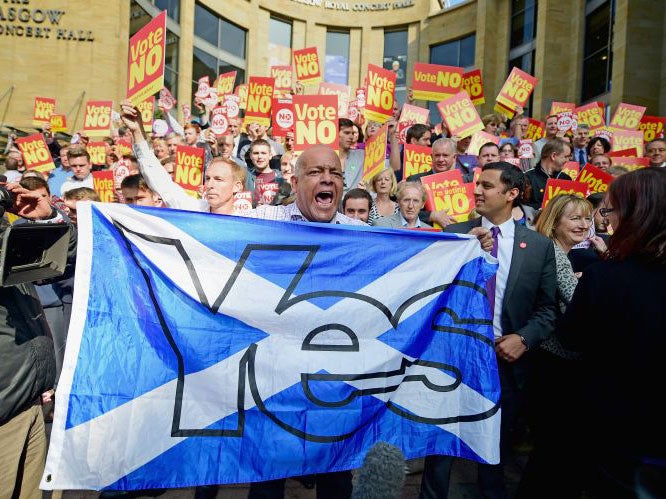Scottish independence: Nationalist leader Jim Sillars threatens pro-union companies with 'day of reckoning' after independence
Leading bank claims ‘Yes’ vote would result in worst depression since 1930s

Your support helps us to tell the story
From reproductive rights to climate change to Big Tech, The Independent is on the ground when the story is developing. Whether it's investigating the financials of Elon Musk's pro-Trump PAC or producing our latest documentary, 'The A Word', which shines a light on the American women fighting for reproductive rights, we know how important it is to parse out the facts from the messaging.
At such a critical moment in US history, we need reporters on the ground. Your donation allows us to keep sending journalists to speak to both sides of the story.
The Independent is trusted by Americans across the entire political spectrum. And unlike many other quality news outlets, we choose not to lock Americans out of our reporting and analysis with paywalls. We believe quality journalism should be available to everyone, paid for by those who can afford it.
Your support makes all the difference.A nationalist leader has warned that an independent Scotland would take revenge on unionist businesses supporting a No vote as the campaign for independence turned vicious.
With a new opinion poll showing the race is still neck and neck, the SNP’s former deputy leader Jim Sillars said pro-union companies would face “a day of reckoning” if Scotland became independent next Friday.
Mr Sillars threatened that BP’s operations in the North Sea could be nationalised and said a future Scottish Government would not be as “soft as we have been forced to be” as part of the UK.
Tellingly, Alex Salmond failed to criticise the remarks by his former deputy with whom he was out campaigning earlier in the week. But Labour said they amounted to a “clear threat” and were characteristic of what had become a campaign of “fear and intimidation” by nationalists.
Meanwhile, the most hardline criticism yet of moves for independence came last night from Deutsche Bank, Europe’s biggest investment bank – claiming it could throw the country back into a depression the likes of which have not been seen since the 1920s and ‘30s.
Labour figures travelling with Ed Miliband told The Independent they are concerned by the increasingly unpleasant and well-orchestrated attempts by Yes supporters to disrupt their events.
They added that the situation had got worse in the last few days and all their visits now had a heavy police presence.
Mr Salmond has consistently denied that such disruption is coordinated or condoned but this is treated with considerable scepticism by the Better Together campaign.
At a press conference on Thursday, Yes supporters heckled the BBC’s political editor Nick Robinson as he pushed Mr Salmond about the impact of independence on the Scottish financial sector.
Mr Sillar’s remarks came after a string of businesses including RBS, John Lewis and Virgin warned of the risks of an independence vote.

Speaking from his campaign trail, he said that employers were “subverting Scotland’s democratic process”.
“This referendum is about power, and when we get a Yes majority, we will use that power for a day of reckoning with BP and the banks,” he said. “The heads of these companies are rich men, in cahoots with a rich English Tory Prime Minister, to keep Scotland’s poor poorer through lies and distortions. The power they have now to subvert our democracy will come to an end with a Yes.”
He added: “BP, in an independent Scotland, will need to learn the meaning of nationalisation, in part or in whole, as it has in other countries who have not been as soft as we have forced to be. We will be the masters of the oil fields, not BP or any other of the majors.”
A spokesman for Yes Scotland said: “Jim is a passionate campaigner. The current Scottish Government’s proposals for an independent Scotland are set out in great detail in the white paper – including the job-creating powers Scotland so badly needs – and that is what people are voting for.”
The Labour MP for Glasgow South West, Ian Davidson, said they showed the Yes campaign’s “mask had slipped”.
“His words are a clear threat to anyone who points out the true costs of separation to the people of Scotland,” he said.

“The Yes campaign has been a campaign of fear and intimidation from the start. Many people have been silenced. Now those who put their head above the parapet get pot shots from desperate nationalists.”
In a sign of how seriously the prospect of a Yes vote is being treated in Westminster, George Osborne and Bank of England Governor Mark Carney announced that they were pulling out of G20 talks in Australia so they could be in the UK for the result.
The Chancellor said he had taken the decision because of the “economic risks” of independence, while the Bank of England said Mr Carney would still attend the meeting but would return home early.

Their concern was underlined by a lengthy statement from Deutsche Bank, signed by Deutsche Bank board director David Folkerts-Landau, which said: “A Yes vote would go down in history as a political and economic mistake as large as Winston Churchill’s decision in 1925 to return the pound to the Gold Standard or the failure of the Federal Reserve to provide sufficient liquidity to the US banking system, which we now know brought on the Great Depression in the US.
“These decisions – well-intentioned as they were – contributed to years of depression and suffering and could have been avoided had alternative decisions been taken.”
It also warned starkly against hopes that Scotland would follow independent Norway, Denmark and Sweden because its economy is totally different. Norwegian oil and gas production is not expected to decline like Scotland’s, Denmark has more high-value manufacturing and Norway has its own currency, allowing it to manage its economic cycle easily.
And it cautioned that an independent Scotland would need to hike interest rates in order to prevent global investors moving their money to bigger, less risky countries.

Meanwhile, the pound rallied sharply last night to end the week broadly where it was before the shock YouGov poll last weekend as it appeared the No vote camp was again gaining the upper hand. Against the dollar it jumped more than a third of a cent to $1.6267.
More positively for the Yes camp, Lloyds bank clarified that it would not cut jobs if it moved its registration base south of the border after independence, while the chairman of pubs giant JD Wetherspoon poured water on the many extreme claims and threats being hurled at the Yes campaign by businesses this week. Tim Martin told The Independent: “I think there’s been a massive amount of nonsense talked, especially by businessmen, about Scottish independence. There’s no reason why Scotland shouldn’t thrive as an independent economy if that’s what Scots want.”
The latest opinion poll on the referendum, published today, showed the result is on a knife-edge. When undecided voters were excluded, it revealed that 51 per cent of Scots intend to vote No on 18 September with 49 per cent saying they will vote Yes.
It means that the final decision is likely to rest on which way the hundreds of thousands of undecided voters go.
The ICM/Guardian survey suggested that 17 per cent of the country fell in this category, so campaigners on both sides will be desperately racing to win them over in the few days left before the country heads to the polls.
Join our commenting forum
Join thought-provoking conversations, follow other Independent readers and see their replies
Comments